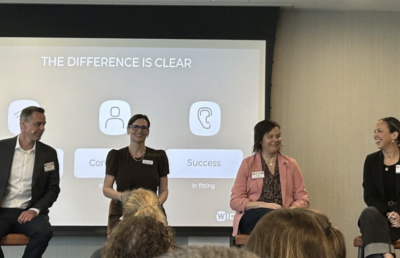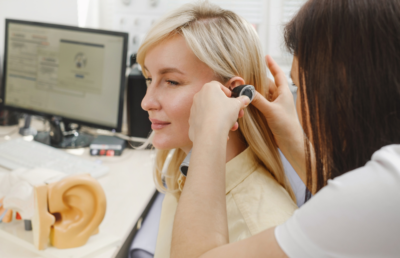If you’ve ever come back from rehearsal or a loud gig and heard ringing, buzzing, whirring, or hissing sounds in your ears, you’ve experienced tinnitus. Fortunately, this is often temporary, lasting for a few hours, days, or weeks. However, if the sound never stops, it means you have chronic tinnitus. No need to worry, you’re not alone, and there are ways to get relief.
Tinnitus is when you experience ringing, buzzing, hissing, or other noises in one or both of your ears. The noise you hear isn’t caused by an external sound, and other people can’t hear it. Tinnitus is quite common, affecting about 15-20% of the general population, but in some industries, such as the music industry, it’s far more prevalent. Most studies reveal that about 40-50% of musicians experience some degree of tinnitus at some point in their lives. This increased prevalence is largely due to higher rates of noise-induced hearing loss amongst people in the music industry. Famous musicians, from Sting to Coldplay’s Chris Martin, Phil Collins, Barbra Streisand, Eric Clapton, Ozzy Osbourne, and many more struggle with tinnitus and are trying to raise awareness.
While tinnitus is a constant struggle for everyone who lives with it, its emotional and psychological impacts are often greater for musicians for a variety of reasons. Firstly, tinnitus can negatively affect your perception of sound and music, which can feel threatening to your career. Also, musicians spend enormous amounts of time focusing on tiny differences in sound and frequency, making them especially aware of their tinnitus. In the music industry, tinnitus is often a result of frequent exposure to loud sounds without proper ear protection. Although there’s currently no cure for tinnitus, it will not put a stop to your music career, as lasting relief is achievable.
How to relieve your tinnitus?
Use ear protection
The importance of ear protection cannot be stressed enough. While foam or silicone earplugs can limit you in hearing music clearly, musician’s earplugs are a great option for most people. Rather than blocking out as much sound as possible, special filters are used to reduce the decibel volume level as evenly as possible. This means that you can still hear everything clearly, just at a lower volume. You can buy a pair off-the-shelf or have them custom molded for you by an audiologist.
Use tinnitus maskers
Tinnitus maskers are electronic hearing devices that generate and emit broad-band or narrow-band noise at low levels, designed to drown out the auditory sensations of tinnitus. They produce white or pink noise to add an artificial sound to your environment. Many people find that by using a masker, they are better able to focus, relax, and fall asleep, therefore, using a masker at night may help you get a better night’s sleep.
Relax and give your ears a break
As we’re constantly exposed to noises and sounds, our ears sometimes need a break —especially if you’re a musician. Relaxation is important in two ways. Firstly, it helps ward off tinnitus. For many people, stress is a trigger for their tinnitus, so learning some relaxation techniques can help prevent it before it begins. Secondly, when you do experience tinnitus, calming your body and mind is a crucial tool to help keep it from affecting your entire life. In some cases, all you need to do is briefly refocus your attention on something else to find relief from your tinnitus, which can often be achieved by regularly practicing meditation techniques, exercising, or doing yoga.
Try Tinnitus Retraining Therapy
Tinnitus Retraining Therapy (TRT) is a process of learning to cope with your tinnitus on a conscious and subconscious level. This technique has helped a lot of people to get stress reductions and a better quality of life. Tinnitus Retraining Therapy requires close co-operation with hearing professionals. The therapy is employed at the perceived source of the tinnitus and aims to teach the brain to ignore it.
Wear hearing aids
Many musicians and music aficionados experience both hearing loss and tinnitus. While older versions of hearing aids weren’t ideal for listening to music as they often compressed the dynamic range to unpleasant levels, more modern hearing aids are highly customizable and can also include customized tinnitus masking programs. Properly fit amplification can reduce tinnitus by 60%. A professional audiologist can help you choose a hearing aid that best suits your needs.
Living with tinnitus can be annoying and overwhelming, and it can affect your career as a musician. However, with perseverance and support from a highly trained Doctor of Audiology, the perceived burden of tinnitus can be significantly reduced.
Take action today to control your tinnitus and lessen its impact on your life. Discover the currently available treatments and find other resources to help you manage your tinnitus. Book an appointment for a simple evaluation today.





